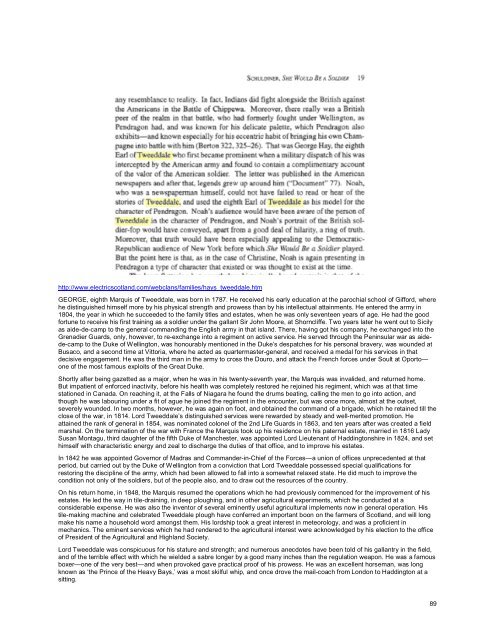Grand Masters of Scotland - Onondaga and Oswego Masonic ...
Grand Masters of Scotland - Onondaga and Oswego Masonic ...
Grand Masters of Scotland - Onondaga and Oswego Masonic ...
You also want an ePaper? Increase the reach of your titles
YUMPU automatically turns print PDFs into web optimized ePapers that Google loves.
http://www.electricscotl<strong>and</strong>.com/webclans/families/hays_tweeddale.htm<br />
GEORGE, eighth Marquis <strong>of</strong> Tweeddale, was born in 1787. He received his early education at the parochial school <strong>of</strong> Gifford, where<br />
he distinguished himself more by his physical strength <strong>and</strong> prowess than by his intellectual attainments. He entered the army in<br />
1804, the year in which he succeeded to the family titles <strong>and</strong> estates, when he was only seventeen years <strong>of</strong> age. He had the good<br />
fortune to receive his first training as a soldier under the gallant Sir John Moore, at Shorncliffe. Two years later he went out to Sicily<br />
as aide-de-camp to the general comm<strong>and</strong>ing the English army in that isl<strong>and</strong>. There, having got his company, he exchanged into the<br />
Grenadier Guards, only, however, to re-exchange into a regiment on active service. He served through the Peninsular war as aidede-camp<br />
to the Duke <strong>of</strong> Wellington, was honourably mentioned in the Duke’s despatches for his personal bravery, was wounded at<br />
Busaco, <strong>and</strong> a second time at Vittoria, where he acted as quartermaster-general, <strong>and</strong> received a medal for his services in that<br />
decisive engagement. He was the third man in the army to cross the Douro, <strong>and</strong> attack the French forces under Soult at Oporto—<br />
one <strong>of</strong> the most famous exploits <strong>of</strong> the Great Duke.<br />
Shortly after being gazetted as a major, when he was in his twenty-seventh year, the Marquis was invalided, <strong>and</strong> returned home.<br />
But impatient <strong>of</strong> enforced inactivity, before his health was completely restored he rejoined his regiment, which was at that time<br />
stationed in Canada. On reaching it, at the Falls <strong>of</strong> Niagara he found the drums beating, calling the men to go into action, <strong>and</strong><br />
though he was labouring under a fit <strong>of</strong> ague he joined the regiment in the encounter, but was once more, almost at the outset,<br />
severely wounded. In two months, however, he was again on foot, <strong>and</strong> obtained the comm<strong>and</strong> <strong>of</strong> a brigade, which he retained till the<br />
close <strong>of</strong> the war, in 1814. Lord Tweeddale’s distinguished services were rewarded by steady <strong>and</strong> well-merited promotion. He<br />
attained the rank <strong>of</strong> general in 1854, was nominated colonel <strong>of</strong> the 2nd Life Guards in 1863, <strong>and</strong> ten years after was created a field<br />
marshal. On the termination <strong>of</strong> the war with France the Marquis took up his residence on his paternal estate, married in 1816 Lady<br />
Susan Montagu, third daughter <strong>of</strong> the fifth Duke <strong>of</strong> Manchester, was appointed Lord Lieutenant <strong>of</strong> Haddingtonshire in 1824, <strong>and</strong> set<br />
himself with characteristic energy <strong>and</strong> zeal to discharge the duties <strong>of</strong> that <strong>of</strong>fice, <strong>and</strong> to improve his estates.<br />
In 1842 he was appointed Governor <strong>of</strong> Madras <strong>and</strong> Comm<strong>and</strong>er-in-Chief <strong>of</strong> the Forces—a union <strong>of</strong> <strong>of</strong>fices unprecedented at that<br />
period, but carried out by the Duke <strong>of</strong> Wellington from a conviction that Lord Tweeddale possessed special qualifications for<br />
restoring the discipline <strong>of</strong> the army, which had been allowed to fall into a somewhat relaxed state. He did much to improve the<br />
condition not only <strong>of</strong> the soldiers, but <strong>of</strong> the people also, <strong>and</strong> to draw out the resources <strong>of</strong> the country.<br />
On his return home, in 1848, the Marquis resumed the operations which he had previously commenced for the improvement <strong>of</strong> his<br />
estates. He led the way in tile-draining, in deep ploughing, <strong>and</strong> in other agricultural experiments, which he conducted at a<br />
considerable expense. He was also the inventor <strong>of</strong> several eminently useful agricultural implements now in general operation. His<br />
tile-making machine <strong>and</strong> celebrated Tweeddale plough have conferred an important boon on the farmers <strong>of</strong> <strong>Scotl<strong>and</strong></strong>, <strong>and</strong> will long<br />
make his name a household word amongst them. His lordship took a great interest in meteorology, <strong>and</strong> was a pr<strong>of</strong>icient in<br />
mechanics. The eminent services which he had rendered to the agricultural interest were acknowledged by his election to the <strong>of</strong>fice<br />
<strong>of</strong> President <strong>of</strong> the Agricultural <strong>and</strong> Highl<strong>and</strong> Society.<br />
Lord Tweeddale was conspicuous for his stature <strong>and</strong> strength; <strong>and</strong> numerous anecdotes have been told <strong>of</strong> his gallantry in the field,<br />
<strong>and</strong> <strong>of</strong> the terrible effect with which he wielded a sabre longer by a good many inches than the regulation weapon. He was a famous<br />
boxer—one <strong>of</strong> the very best—<strong>and</strong> when provoked gave practical pro<strong>of</strong> <strong>of</strong> his prowess. He was an excellent horseman, was long<br />
known as ‘the Prince <strong>of</strong> the Heavy Bays,’ was a most skilful whip, <strong>and</strong> once drove the mail-coach from London to Haddington at a<br />
sitting.<br />
89







![Richard [Nicholls] Harison / Harrison - Onondaga and Oswego ...](https://img.yumpu.com/24950065/1/190x245/richard-nicholls-harison-harrison-onondaga-and-oswego-.jpg?quality=85)
![Richard [Nicholls] Harison / Harrison - Onondaga and Oswego ...](https://img.yumpu.com/24950063/1/190x245/richard-nicholls-harison-harrison-onondaga-and-oswego-.jpg?quality=85)








